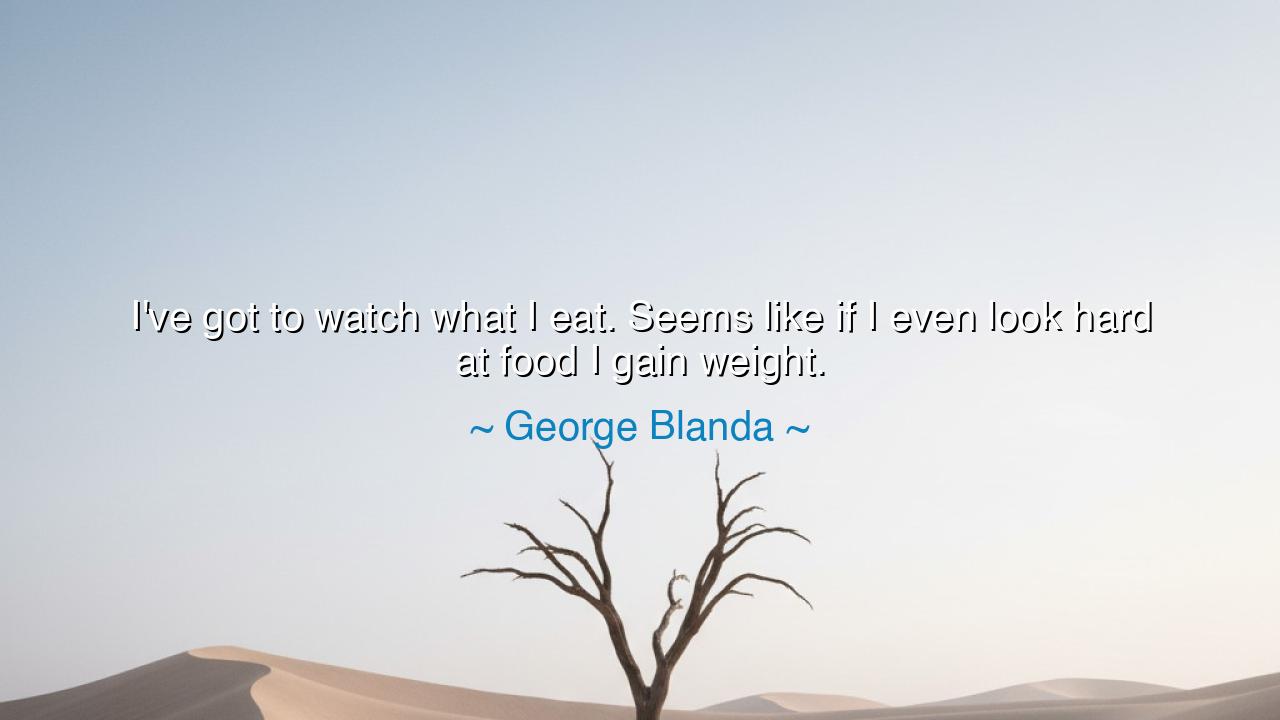
I've got to watch what I eat. Seems like if I even look hard at






Host: The room was quiet, the soft light from the lamp casting a cozy glow across the table. Outside, the world had quieted, and the peaceful rhythm of the evening filled the air. Jeeny sat at the table, her fingers gently tracing the rim of her cup, lost in thought. Jack, standing near the window, gazed out into the darkened world, his expression thoughtful. The silence between them felt comfortable, but it was clear that the words they were about to discuss carried deeper meaning.
Jeeny: (breaking the silence, her voice calm but reflective) “I came across something by George Blanda today that really made me think. He said, ‘I’ve got to watch what I eat. Seems like if I even look hard at food I gain weight.’ What do you think about that?”
Jack: (pauses, his voice thoughtful) “It’s a pretty relatable sentiment, isn’t it? A lot of people can probably identify with the idea that no matter how hard you try, the body’s metabolism and reaction to food can sometimes feel out of control. It’s almost like Blanda is pointing to the frustration of trying to manage your weight and health, only to feel like your body has a mind of its own. You watch what you eat, but sometimes, even the thought of food seems to trigger weight gain. It can be a very discouraging feeling.”
Jeeny: (nodding slowly) “Exactly. I think he’s talking about that sense of helplessness that comes with weight management. No matter how much you try to exercise or eat right, sometimes the results don’t match the effort you put in. For some people, their bodies seem to react to food in ways that don’t seem fair or logical. It’s frustrating when you feel like you have no control over something as basic as what you eat.”
Host: The stillness in the room deepened as the conversation continued. Jack turned slightly toward Jeeny, his expression softening as he considered the broader implications of Blanda’s words. Outside, the world had quieted, but inside, the conversation had shifted inward, reflecting on the struggles that come with body image, self-control, and the often frustrating nature of managing one’s health.
Jack: (his voice quieter now, more introspective) “What strikes me is how this speaks to the psychological aspect of weight management. It’s not just about eating habits—it’s about the mental load of constantly thinking about food and weight. It can make you feel like you’re fighting against your own body, like no matter what you do, you’re not in control. That frustration can have its own impact on mental health, too. It’s not just physical; it’s emotional and psychological.”
Jeeny: (softly) “Yes, and I think it speaks to how much we tie self-worth to our bodies and our appearance. When we struggle with weight, it can feel like a personal failure, even though there are so many factors that go into it, many of which we can’t control. Our genetics, metabolism, and even our environment play huge roles in how we gain or lose weight. But the societal pressure to look a certain way can make those internal struggles feel like a burden we have to carry alone.”
Jack: (nodding slowly) “Exactly. And it’s a reminder that health isn’t just about the number on the scale. It’s about how we treat our bodies, mentally and physically, and how we cope with the pressures that come with managing our health. Blanda’s words highlight the emotional toll it takes when your body doesn’t respond the way you expect it to. It’s not just about what you eat—it’s about the relationship you have with food, your body, and the world’s expectations of both.”
Jeeny: (smiling gently) “Yes. It’s about being kind to yourself and recognizing that there are many things beyond our control. Weight, health, and appearance don’t define who we are as individuals. What’s more important is how we feel inside, how we treat our bodies, and how we care for our mental and emotional health. Managing your weight or health shouldn’t be about perfection—it’s about finding balance and being forgiving with yourself along the way.”
Host: The quiet between them grew deeper now, as the conversation continued. Outside, the world had quieted, but inside, the room was filled with a shared understanding about the complexities of body image, weight management, and the mental toll of navigating societal pressures. Jeeny and Jack had uncovered a deeper truth in Blanda’s words—that managing weight and health is not just about what we eat or how we look, but about how we navigate the mental and emotional aspects of these struggles.
Jack: (smiling softly, his voice more assured) “It’s a reminder that we need to be compassionate with ourselves. Weight and health are complex, and the most important thing is to take care of our minds and bodies, without the weight of perfectionism.”
Jeeny: (nodding warmly) “Exactly. The journey toward health isn’t about being perfect—it’s about embracing where we are, making adjustments when necessary, and showing ourselves kindness along the way.”
Host: The world outside had quieted to a peaceful stillness, but inside, the room was filled with understanding. Jeeny and Jack had uncovered the deeper meaning in Blanda’s words—that managing weight and health is a complex, emotional journey, and true well-being comes from balance, self-compassion, and understanding. The night continued outside, but inside, the room felt full of the realization that health is not just about the scale, but about the relationship we build with our bodies and ourselves.






AAdministratorAdministrator
Welcome, honored guests. Please leave a comment, we will respond soon